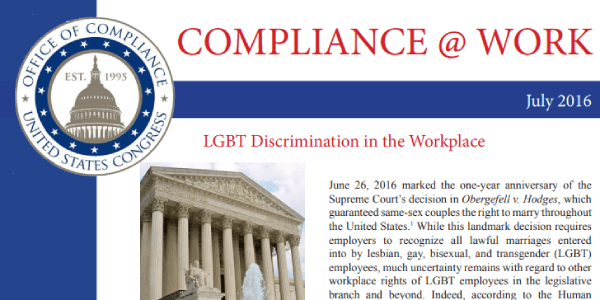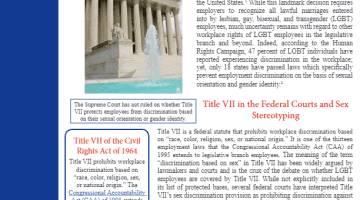June 26, 2016 marked the one-year anniversary of the Supreme Court’s decision in Obergefell v. Hodges, which guaranteed same-sex couples the right to marry throughout the United States.1 While this landmark decision requires employers to recognize all lawful marriages entered into by lesbian, gay, bisexual, and transgender (LGBT) employees, much uncertainty remains with regard to other workplace rights of LGBT employees in the legislative branch and beyond. Indeed, according to the Human Rights Campaign, 47 percent of LGBT individuals have reported experiencing discrimination in the workplace; yet, only 18 states have passed laws which specifically prevent employment discrimination on the basis of sexual orientation and gender identity.
Title VII in the Federal Courts and Sex Stereotyping
Title VII is a federal statute that prohibits workplace discrimination based on “race, color, religion, sex, or national origin.” It is one of the thirteen employment laws that the Congressional Accountability Act (CAA) of 1995 extends to legislative branch employees. The meaning of the term “discrimination based on sex” in Title VII has been widely argued by lawmakers and courts and is the crux of the debate on whether LGBT employees are covered by Title VII. While not explicitly included in its list of protected bases, several federal courts have interpreted Title VII’s sex discrimination provision as prohibiting discrimination against employees on the basis of sexual orientation and gender identity. Moreover, courts around the country have held that employment actions motivated by gender stereotyping amount to unlawful sex discrimination.
In 1989, in Price Waterhouse v. Hopkins, the Supreme Court ruled that Title VII’s protection based on “sex” also protects individuals from discrimination for failure to conform to sex stereotypes.3 Sex stereotyping occurs when an individual is discriminated against based on that person’s non-conformance with a gender stereotype. In Price Waterhouse, a woman prevailed on a sex discrimination claim by alleging that she was denied a promotion because she needed to “walk more femininely, talk more femininely, dress more femininely, wear make-up, have her hair styled, and wear jewelry.”

